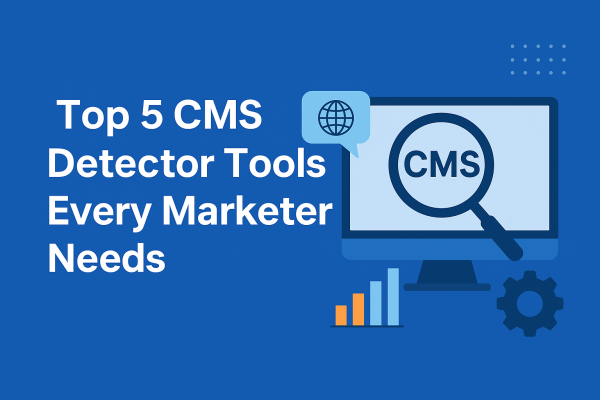Looking for the best CMS detector tools for your website? You’re in the right place!
Building a custom website from scratch has always been a demanding task. From designing layouts and writing error-free code to ensuring smooth navigation and advanced functionalities, the process requires time, skill, money, and patience. For many, it felt overwhelming—until CMS platforms came into the picture.
CMS platforms completely changed the game. They made website creation simple, flexible, and accessible for beginners and professionals a like. With pre-built themes, drag-and-drop editors, SEO-friendly features, plug-and-play extensions, and zero coding requirements, CMSs quickly became the go-to choice for millions of website owners.
But there is one question people still struggle with:
“How do you find out which CMS a website is using?”
That’s exactly where CMS detector tools come in. In this blog, you’ll learn what a CMS detector is, why it’s useful, how it works, its different types, and the top tools you should try.
What Is a CMS Detector?
A CMS (Content Management System) detector is an online tool that identifies the CMS platform used to build a website. Whether a site is created with WordPress, Shopify, Joomla, Wix, Magento, or any other CMS, these tools can detect it instantly.
Beyond CMS identification, these tools often reveal deeper insights such as:
- Web server type
- Programming languages used
- JavaScript libraries
- Database information
- Security vulnerabilities
- Plugins and themes
This information is extremely helpful for developers, marketers, SEO, and competitors researching industry trends.
How Does a CMS Detector Work?
Most CMS detectors are very simple to use. You just enter a website URL, click “Detect,” and the tool analyzes the site’s technology stack within seconds.
But how does it work behind the scenes?
1. Meta Generator Tag Scanning
Many websites include a Meta Generator Tag in their HTML code that reveals the CMS version.
Example:
If this tag exists, the detector identifies the CMS immediately.
2. Code & Script Analysis
If the tag isn’t available, the detector examines the site’s code structure, scripts, libraries, and directory patterns.
This helps reveal the CMS, framework, and backend technology.
3. Checking HTTP Headers
If a website hides its code well, the detector inspects the HTTP request headers.
Headers often contain server information that indirectly hints at the CMS or platform used.
4. Full Technology Fingerprinting
Advanced tools combine multiple detection methods to identify even heavily customized websites.
Why Use a CMS Detector Tool?
CMS detection tools are beneficial for:
Website Owners
To learn about their platform, plugins, and tech stack.
Developers
To study competitor websites and choose better technologies.
SEO Experts
To optimize website loading speed, performance, and overall structure.
Startups & Agencies
To analyze sites quickly without manual research.
Businesses Planning Migration
To understand a site's current platform before re-building or migrating.
These tools save time, reduce guesswork, and offer detailed insights that help make better technical decisions.
4 Types of CMS Detector Tools
There are several kinds of CMS detection tools, each with its own purpose:
1. Online CMS Detectors
These are simple websites where you paste a URL to detect the CMS.
They are user-friendly and support platforms like WordPress, Shopify, Wix, and more.
2. Browser Extension Detectors
These tools run directly from your browser (Chrome/Firefox).
They provide quick, real-time detection without visiting another website.
3. Server-Side CMS Detectors
These tools analyze server information, HTTP responses, and backend code.
They are great for technical users and competitor research.
4. Code Analysis Detectors
These tools inspect code quality, detect errors, and analyze performance issues.
They help developers identify bugs like memory leaks and security holes.
Top 5 Online CMS Detectors You Must Try
1. Wappalyzer
Wappalyzer is one of the most popular website technology detectors.
It identifies:
- CMS
- Analytics tools
- Frameworks
- Programming languages
- OS
- eCommerce technologies
Pros:
- Fast and accurate
- Free to install
- Easy-to-read reports
- Works on Chrome & Firefox
Cons:
- Limited free credits
- Some advanced data requires paid plans
2. WhatCMS
WhatCMS is a simple tool that detects CMS platforms, hosting details, frameworks, and plugins.
Pros:
- Easy interface
- Quick results
- Good accuracy
- Detects security issues
Cons:
- Not always 100% precise
- Sometimes outdated
- Limited SEO insights
3. BuiltWith
BuiltWith provides highly detailed CMS detection along with analytics and technology insights.
Its reports are visual and easy to understand.
Pros:
- Deep analysis
- Free basic version
- Great for developers
- Shows technology trends
Cons:
- Paid plans are expensive
- Accuracy decreases on custom sites
4. W3Techs
W3Techs gives technical insights into operating systems, servers, and backend languages.
It offers detailed statistics and usage trends.
Pros:
- Highly detailed data
- Great for research
- Reliable insights
Cons:
- Limited information on modern technologies
- Not beginner-friendly
5. Rescan.io
Rescan is a simple and fast online CMS detection tool.
Just enter a URL and get instant insights.
Pros:
- Free & quick scanning
- No installation
- Supports multiple CMS tools
Cons:
- Not accurate for customized websites
- Limited features
Conclusion
Manual website inspection is time-consuming and often inaccurate. CMS detector tools simplify this process with speed, automation, and precision. With just a URL, you can instantly uncover a site's CMS for web development, technologies, security risks, and more.
Automation has changed the way we analyze websites. It saves effort, increases productivity, and delivers insights far beyond what manual research can offer. Whether you're a developer, marketer, business owner, or someone exploring website technologies, CMS detectors are powerful tools worth adopting.
If you're ready to streamline your website research, start using the CMS detectors listed above—and make smarter, more informed decisions for your online presence.

